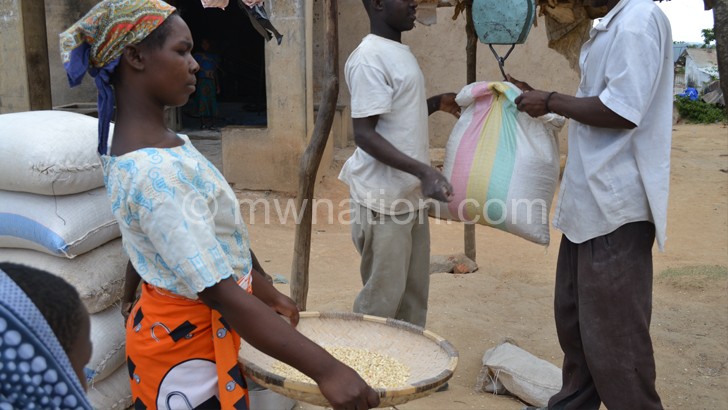Traders justify high maize prices
The market for maize, Malawi’s staple grain, continues to make history with prices peaking at as high as K300 (about $0.4) per kilogramme (kg), out of reach for a majority of people. This price translates to K15 000 (about $20) per 50 kg bag.
Business Review maize price inquiry in various districts and those quoted by World Food Programme (WFP) mobile Vulnerability Analysis and Mapping (mVAM) survey in February 2016, point to one thing: maize prices have shot through the roof.
Capitalising on the lack of grain in most Admarc markets, private traders have found an opportunity to profiteer. While they continue to do so, the citizenry continue to dig deeper into their pockets, at a time monthly incomes remain stagnant, amid a turbulent economic time.

At Chamama Market in Kasungu, maize trader, Dyton Foloma, said in an interview last week the rise in the selling price is a result of a rise in its cost price. He sells maize at K250 per kg.
“We used to buy a kilogramme at K140, but now it has gone up to K220.
“If you look at all costs involved in bringing the grain here, selling at K250 per kilogramme is not profiteering. Actually the price will go up soon because we need to make profits as well,” he said.
At Misuku in Chitipa, there is no maize at the market, but a resident there, Maxwell Masebo, said the grain is selling at a minimum of K260 per kg. In some cases, the grain goes up to as high as K270 per kg, he said. The same price is prevalent at Chitipa Boma.
“The problem here is that even vendors do not have maize; it is only found with a few people in their houses. So, looking at the current demand, they are charging exorbitantly. Without maize at Admarc, who can blame them?” he wondered.
In Balaka, the grain is selling at K260 per kg at Kantwanje Market near Utale, while people from Dziwe area purchase the commodity at K280 per kg.
The price goes up to K300 per kg when maize supply at Dziwe and Mpirisi falls, according to a resident there, Chiwaula Kabwere.
At Mbiza Market in Mulanje, trader Steven Mulawira sells the commodity at K280 per kg and warns that the price would continue to rise.
“You can go to Likhubula [in Mulanje], people there are buying maize at K300 per kg because where we get this maize, the price has also gone up,” he said.
The grain is also sold at K280 per kg at Chinakanaka, Msikawanjala and Mulanje Mission markets.
Lameck Mpando, a trader at Mulanje Mission Market, acknowledged that the price was high, but said “vendors have no choice”.
“If we reduce the price, say to K200 per kg, we will be out of business. Market forces are determining the price and it is hurting consumers, but there is nothing we can do. We are in this problem together,” he said.
The mVAM report corroborates: “In the fourth week of January, maize was selling at an average K260 per kg in Blantyre, Nsanje, Balaka, Machinga, Mulanje and Mangochi. These prices are 170 percent higher than the three-year average for the same period.
“Across the monitored markets, maize prices ranged between K195 and K270 per kilogramme. Markets with highest prices were at Mangamba and Mbonechela in Machinga; Chinakanaka and Muloza in Mulanje.”
Meanwhile, Competition and Fair Trading Commission (CFTC) has expressed concern with some traders who are reportedly engaged in conducts that violate the Competition and Fair Trading Act and the Consumer Protection Act.
CFTC executive director Charlotte Malonda, in a statement, said some of the unfair trading practices include withholding maize supplies or hoarding with the intention of triggering a price increase.
“Use of incorrect measures or weights with a view to deceive or mislead consumers; false representation regarding the weight of maize sold to consumers and unconscionable conduct through charging excessive prices which are exploitative to consumers,” she said.
Malonda warned all maize traders that those found engaging in these practices will be fined K500 000 or an amount equivalent to the financial gains of the offence, which ever is higher and a five-year imprisonment upon conviction. n





